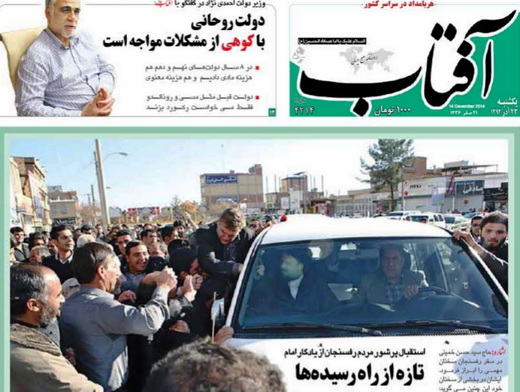Legitimate freedoms should not be taken hostage by religiosity. This is what Seyyed Hassan Khomeini, the grandson of the late Imam Khomeini, told a crowd of political activists in Rafsanjan where he attended a function to mark the third anniversary of the passing of Ayatollah Sheikh Mohammad Hashemian, the Friday Prayer Leader of the city in Kerman Province. The following is the translation – in part – of his remarks on December 12 as reported by Aftab-e Yazd daily:
That today some people openly mention the name of [the late] Imam and support his ideals is a good idea. Talking about him today does not land you in jail, nor does it make you exposed to torture. That was not the case in the past [before the Revolution, though]. Past supporters did not have the slightest idea of what would come next, nor were they trying to get their hands on any position of authority or property.
Those who come on board after a triumph [a reference to Koranic words that those who joined the Prophet Muhammad’s army only after it secured victory did a good job, but it was not comparable with the belief of those who were with the Prophet when there were no material gains] are not necessarily bad people. Some of them are young and were not born when the victory took place.
However, some newcomers have launched publicity campaigns to sully the reputation of old, veteran figures. Ayatollah Hashemi Rafsanjani, for instance, is somebody.
He was only a few steps away from death, but came out unharmed thanks to the divine favor. Among Qom-based seminary school students, he was known as the Imam’s foreign minister because of his support for Imam. Disagreements may emerge, but it is not a good idea to doubt someone’s credentials from the start.
Imam championed a school of thought which sought independence, freedom and religiosity. Extra care should be taken not to let independence come at the expense of freedom, nor should religiosity be taken hostage by freedom and vice versa. Imam’s way of thinking includes these three aspects, but sometimes only one single aspect is highlighted.
We should be vigilant not to allow religiosity to be sidelined under the pretext of [exercising the right to] freedom and keep silent if legitimate freedoms are restricted only to serve religious causes.
Over the centuries, foreign powers have always held sway in Iran, but today political independence is one of the biggest achievements of the Islamic Revolution. Freedom should not be stifled under the pretext of independence, because the Islamic Revolution has brought about a big gain and that is freedom of criticism and speech.
Currently what matters is not to remove personal misunderstandings; rather, we should push hard to make all misunderstandings and feuds a thing of the past. In an Islamic society when people nurse grudges against each other, friendship will be damaged, and the absence of friendship marks the start of social disintegration.
We need to be sensitive to corruption no matter where it happens. As the Supreme Leader has put it, freedom of those who exercise “promotion of virtue and prevention of vice” is a requirement for such sensitivity. To that end mass media which have the power to publicize things should enjoy freedom. For a society to get rid of corruption it should practice self-control and its members should be vigilant about what problems the society they live in faces.
